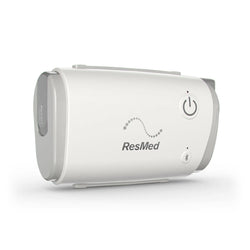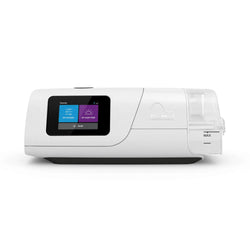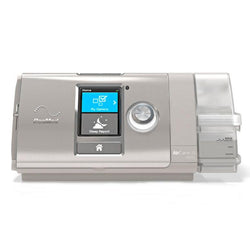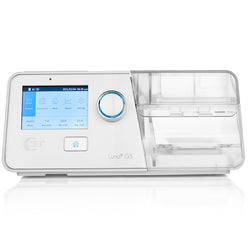Getting started with Positive Airway Pressure (PAP) therapy after a diagnosis for sleep apnea or another respiratory condition can feel overwhelming.
Often, you might hear about both CPAP and BiPAP machines, and with similar-sounding names, it's easy to get confused. While both devices are key tools in respiratory care, they function differently and aren't simply interchangeable options.
This article explains the core differences: how each machine operates, the technical and therapeutic distinctions, why one might be prescribed over the other, the conditions each typically treats, and provides context with real-world use cases.
Clinical research exploring the effectiveness of CPAP and BiPAP supports understanding these differences. Evidence indicates distinct roles, such as findings suggesting BiPAP may be more suitable for certain patients with COPD and obesity hypoventilation. Similarly, other research highlights CPAP as a cost-effective, first-line treatment for many with Obstructive Sleep Apnea.
What’s the Difference?
BiPAP and CPAP machines both support breathing during sleep, but CPAP delivers one fixed pressure, while BiPAP uses two — a higher pressure when you inhale and a lower one when you exhale.
So, what does that mean for you in practical terms? Here are the main things that set them apart:
-
Air pressure delivery: CPAP uses one constant pressure; BiPAP alternates between inhale and exhale pressure levels
-
Comfort level: BiPAP may feel easier to breathe with for users who need higher pressures
-
Common usage: CPAP is typically prescribed for Obstructive Sleep Apnea (OSA); BiPAP is often used for more complex conditions like Central Sleep Apnea (CSA) or COPD
-
Cost: BiPAP machines are generally more expensive due to their dual-pressure function
-
Machine complexity: CPAP devices are simpler; BiPAP units have more advanced pressure settings
What Is a CPAP Machine and How Does It Work?
So, you've heard about CPAP machines, but what exactly are they all about? Let's break it down.
CPAP stands for Continuous Positive Airway Pressure. At its heart, a CPAP machine is a device that helps you breathe more easily while you sleep by delivering a constant, fixed stream of pressurized air through a hose and a mask. It's most commonly prescribed for folks dealing with Obstructive Sleep Apnea (OSA).
How does it actually do its job? It's pretty straightforward:
-
The machine itself is a small unit that draws in the air from your room.
-
It then gently pressurizes that air to a consistent level prescribed by your doctor.
-
This pressurized air travels through a tube and is delivered to a mask that you wear over your nose, mouth, or both.
-
This steady, gentle flow of air acts like a splint, keeping your airway open throughout the night and preventing those breathing interruptions, or apneas, that are characteristic of sleep apnea.
CPAP therapy is primarily used to treat Obstructive Sleep Apnea (OSA), which often comes with symptoms like:
-
Loud snoring
-
Interrupted breathing during sleep (apneas)
-
Daytime sleepiness or fatigue
-
Morning headaches
-
Poor concentration
-
Irritability or mood changes
If you're frequently experiencing some of these symptoms, OSA might be the culprit, and CPAP could be a game-changer.
As Dr. Katherine Green, Medical Director of the Sleep Medicine Clinic at University of Colorado Hospital (UCHealth), stated on June 2, 2020, “The gold-standard treatment for sleep apnea is the CPAP machine. If you can wear it, it’s 100% effective. If you can sleep with a CPAP machine, it can provide a 100% correction.”
For many people diagnosed with OSA, CPAP is typically the first treatment option their doctor will recommend. Its consistent, simple pressure delivery is often very effective in keeping the airway from collapsing. It’s a therapy that has been extensively studied and is widely endorsed by sleep specialists.
Dr. Aarthi Ram, a neurologist specializing in sleep medicine at Houston Methodist, mentioned on May 8, 2023, that “A CPAP machine works to prevent apnea episodes during sleep, and it’s a first-line treatment option for both types of sleep apnea.”
It’s important to remember that, as Dr. Noah Siegel, director of Sleep Medicine and Sleep Surgery at Harvard-affiliated Massachusetts Eye and Ear, points out, "The device and its settings are by prescription, just like a medication."
Many reliable CPAP devices are available, with popular choices including the ResMed AirSense 11 AutoSet and the ResMed AirSense 10 AutoSet with HumidAir for everyday use. For those who travel, options like the ResMed AirMini AutoSet offer more portability.
What Is a BiPAP Machine and How Does It Work?
We've covered CPAP. Now, let's talk about its cousin, the BiPAP machine. While it’s also a type of PAP therapy, it works a bit differently.
BiPAP stands for Bilevel Positive Airway Pressure. Think of it like this: while a CPAP machine delivers one steady pressure, a BiPAP machine offers two distinct pressure levels. It delivers a higher pressure when you breathe in (this is called IPAP, for Inspiratory Positive Airway Pressure) and a lower pressure when you breathe out (EPAP, for Expiratory Positive Airway Pressure).
As Dr. Aarthi Ram, a sleep medicine specialist at Houston Methodist, explained on May 8, 2023, “BiPAP stands for bilevel positive airway pressure, meaning it delivers two pressures as opposed to the single pressure delivered by a CPAP… Of the two pressures, one is used when you inhale and the other, a lower pressure, is used when you exhale.”

How BiPAP Works
How does this dual-pressure BiPAP system actually help? Here’s a simple rundown:
-
The machine is smart enough to adjust the air pressure to match your breathing cycle.
-
When you inhale, it gives you a stronger boost of air to make sure your airway stays open.
-
Then, when it’s time to exhale, the pressure drops. This is a big deal because it can make breathing out feel much more comfortable and natural, especially if higher pressures are needed.
This BiPAP dual pressure approach can be particularly helpful for people who have difficulty with respiratory muscle weakness or issues where the brain doesn't consistently signal the body to breathe (central breathing issues), as it supports their breathing pattern more actively.
As Dr. Ryan Butzko, DO, a sleep medicine specialist at SUNY Upstate Medical University, noted on February 22, 2024, “Some people cannot tolerate higher pressures during the night, and [BiPAP] provides a little bit of a break during the breathing cycle to allow you to have lower pressures when you exhale and just higher pressures when you need them.”
Who is BiPAP For?
It's often the next step when CPAP isn’t quite cutting it, either because it’s not tolerated well or isn't fully effective. This might be the case for conditions like:
-
Central Sleep Apnea (CSA): Where the brain doesn't always send the "breathe" signal.
-
Chronic Obstructive Pulmonary Disease (COPD): To help with breathing difficulties.
-
Obesity Hypoventilation Syndrome: When excess weight makes it hard to breathe deeply enough.
-
High-Pressure Needs: For individuals who need very high pressure settings that feel too difficult to exhale against on a CPAP.
-
Certain Neuromuscular or Respiratory Disorders: Conditions that weaken breathing muscles or affect respiratory control.
BiPAP Modes
BiPAP machines also come with different operating modes to tailor the therapy:
-
S (Spontaneous): This mode is all about you. The machine senses your natural breathing rhythm and provides the two pressure levels accordingly.
-
T (Timed): In this mode, the machine delivers breaths at a set rate per minute, regardless of whether you try to take a breath on your own. This is for when more consistent support is needed.
-
S/T (Spontaneous/Timed or Auto): This is a bit of a hybrid. It generally follows your spontaneous breathing but has a backup timed rate. If you don't take a breath for a certain period, the machine will kick in with a timed breath to ensure you're getting the support you need.
For those who need BiPAP therapy, several advanced machines are available. The three commonly prescribed devices include ResMed AirCurve 11 VAuto or its predecessor, the ResMed AirCurve 10 VAuto, as well as the Luna G3 25A BiPAP.
CPAP vs. BiPAP – Key Differences
We’ve looked at CPAP and BiPAP machines individually, but seeing them side-by-side can really help highlight what sets them apart.
While both are effective forms of Positive Airway Pressure (PAP) therapy, they have some key distinctions in how they deliver that pressure, who they're generally prescribed for, and even how insurance approaches them. Let's break down the main differences.
Here’s a quick comparison:
|
Feature |
CPAP |
BiPAP |
|
Air Pressure |
Constant single pressure throughout the night |
Two pressure levels: higher when inhaling (IPAP), lower when exhaling (EPAP) |
|
Comfort |
May feel harder to exhale at high pressures |
Often more comfortable for users with high pressure needs or exhalation difficulty |
|
Price Range |
Lower overall device cost |
Higher due to advanced pressure settings and multiple modes |
|
Common Use |
Obstructive Sleep Apnea (OSA) |
Central Sleep Apnea (CSA), COPD, complex apnea, or CPAP intolerance |
|
Insurance Coverage |
More commonly approved as first-line therapy |
Requires more specific medical documentation; typically approved second-line |
|
Portability |
More portable; includes travel-friendly options |
Generally larger; less portable but improving with newer models |
Beyond these general differences, clinical research also offers some context on their use:
Research findings (like those in PMC3119924) consistently show that CPAP therapy is a cost-effective and reliable first-line treatment for many people with Obstructive Sleep Apnea (OSA). However, it's also noted that some individuals, particularly those needing higher pressure settings, can find it challenging to comfortably exhale against the continuous pressure, which, if not properly managed or adjusted, might affect how consistently they use the therapy.
On the other hand, studies (such as PMC8807907) have indicated that BiPAP therapy can offer greater benefits for certain patient groups, like those with Chronic Obstructive Pulmonary Disease (COPD) who also experience obesity hypoventilation. In these specific cases, BiPAP was shown to be particularly effective in helping to reduce carbon dioxide (CO2) retention and improve overall lung function during sleep.
Which One Do You Need?
So, after learning about CPAP and BiPAP, you might be wondering, "Which one is right for me?" That's a super important question, and the answer really boils down to your specific health situation, the symptoms you're experiencing, and how your body responds to therapy.
Ultimately, a sleep specialist is the one who'll figure out the best fit for you, usually after a thorough look at your sleep study results and your overall symptom history.
To give you a clearer picture of how these machines are typically used, here are some common scenarios:
-
Mild to Moderate Obstructive Sleep Apnea (OSA): CPAP is often the first-line therapy due to its simplicity, effectiveness, and insurance approval for OSA.
-
Complex or Central Sleep Apnea (CSA): BiPAP is commonly used here because it provides more breathing support when the brain isn’t consistently signaling to inhale.
-
Obesity Hypoventilation Syndrome: BiPAP may be helpful in patients with poor oxygen and carbon dioxide exchange, where dual pressure helps improve respiratory function during sleep.
-
COPD with Sleep-Related Breathing Issues: BiPAP is typically used when COPD contributes to nighttime oxygen drops or CO₂ retention, especially when oxygen therapy alone isn’t enough.
-
Difficulty Tolerating CPAP Pressure: If a user finds it hard to exhale against fixed CPAP pressure, a switch to BiPAP may improve comfort and long-term therapy adherence.
No matter what you've read, remember this:
Only your doctor or a licensed sleep professional can truly determine which machine—CPAP or BiPAP—and which specific settings are right for your diagnosis. They'll often use something called a titration study (either in a lab or sometimes with at-home testing) to pinpoint the exact pressures you need.
And don't forget, for successful long-term PAP therapy, factors beyond the machine type, such as a comfortable, well-fitting mask and ease of use, are very important to consider.
CPAP & BiPAP Machines Recommendations
If you're starting to explore PAP therapy options, it can be helpful to see some examples of what's out there. Below are a few commonly used CPAP and BiPAP machines often recommended for home sleep therapy. This list includes models you can typically find online and reflects a range of different user needs and features.
CPAP Machines
-
ResMed AirSense 11 AutoSet: Offers automatic pressure adjustment and sleep tracking via the myAir app. Great for users who want a more personalized and connected therapy experience.
-
ResMed AirSense 10 AutoSet with HumidAir: Reliable and beginner-friendly, this machine includes a built-in humidifier and ramp feature to ease users into therapy.
-
ResMed AirMini AutoSet: The smallest ResMed CPAP device, designed for frequent travelers. Uses waterless humidification and connects to a mobile app for control and tracking.
Popular CPAP Machines
BiPAP Machines
These machines provide that dual-pressure therapy we talked about (one for inhaling, one for exhaling) and are often used for more complex breathing conditions.
-
ResMed AirCurve 11 VAuto with HumidAir: Designed for users with complex sleep apnea or difficulty exhaling on CPAP. Features automatic pressure adjustments and full humidification.
-
ResMed AirCurve 10 VAuto with HumidAir: Offers BiPAP therapy with customizable comfort settings, including ramp and climate control. A solid choice for home use with advanced needs.
-
Luna G3 25A BiPAP Machine: This device provides pressure relief and timed backup breathing support. Includes built-in humidifier and Wi-Fi compatibility for remote monitoring.
Popular BiPAP Machines
Remember, always consult with your doctor or sleep specialist before choosing a device, especially when considering a switch from CPAP to BiPAP or selecting a machine for the first time.
Final Thoughts
Navigating the world of PAP therapy, especially when you're trying to understand the difference between CPAP and BiPAP machines, can feel like a lot at first. Hopefully, walking through how each one works, who they typically help, and what sets them apart has made things a bit clearer.
The biggest takeaway? Choosing between CPAP and BiPAP isn't a one-size-fits-all kind of decision. Each of these devices is designed to tackle different breathing challenges and support varied respiratory needs. That’s why your healthcare provider, particularly a sleep specialist, is so crucial in this journey—they’re the ones who will look at your specific situation and guide you to the therapy that’s truly right for you.
Taking the time to understand these differences in how pressure is delivered, what might feel more comfortable, and the common situations where each machine is used, really does pay off. It means you can go into your doctor's appointments ready to ask more informed questions, you'll be better equipped to gauge if your current therapy is doing its job, and you’ll likely feel more empowered when it's time to look at different equipment options.
Once your doctor confirms what type of machine you need, trusted suppliers like Sleeplay can help you explore options that fit your comfort and lifestyle. Whether you're starting therapy for the first time or switching devices, Sleeplay offers a wide range of machines designed for real-life comfort and support.
FAQs
Can you switch from CPAP to BiPAP therapy?
Yes, you can switch from CPAP to BiPAP if your current therapy isn't effective or comfortable. This change requires a doctor's assessment and recommendation based on your specific needs and response to treatment.
Is BiPAP better for people with COPD?
BiPAP can be more suitable for some COPD patients, especially those with carbon dioxide retention or significant nighttime breathing difficulty. Its dual pressures offer tailored support, but a doctor must determine if it’s appropriate for your specific COPD condition.
Why is BiPAP more expensive than CPAP?
BiPAP machines are pricier due to their more complex technology. They deliver two distinct pressure levels (one for inhaling, one for exhaling) and often include advanced settings for more complicated breathing issues, which increases manufacturing costs.
Do I need a sleep study before getting a BiPAP machine?
Yes, a sleep study is essential before getting a BiPAP. It helps your doctor accurately diagnose your sleep disorder and determine if BiPAP is the necessary treatment, along with the correct pressure settings for it to be effective.
Is it normal to have trouble exhaling with a CPAP machine?
Yes, some people find it hard to exhale against CPAP's continuous pressure, especially if the setting is high. This discomfort is a key reason your doctor might suggest BiPAP, which offers lower pressure when you breathe out.
What’s the difference between CPAP and APAP?
CPAP delivers one single, constant pressure. APAP (Automatic Positive Airway Pressure) automatically adjusts the pressure throughout the night based on your breathing. BiPAP, however, consistently uses two set pressures: a higher one for inhaling and a lower one for exhaling.
Can I use a BiPAP machine for travel?
Yes, many modern BiPAP machines are designed to be portable, much like CPAPs, though some might be a bit larger. If you travel frequently, it's wise to check a specific model’s size, weight, and travel-friendly features.
Does insurance cover BiPAP machines?
Insurance often covers BiPAP machines, but typically with stricter criteria than for CPAP. You'll usually need clear medical documentation showing why BiPAP is necessary, such as CPAP failure or specific diagnoses (e.g., CSA, severe COPD). Always verify coverage with your insurance plan.
What are the side effects of using a BiPAP machine?
BiPAP side effects are generally similar to CPAP and can include dry mouth or nose, mask leaks, skin irritation, or bloating. These issues can often be managed with a proper mask fit, using humidification, and making adjustments with your doctor’s guidance.
Is BiPAP used for anything other than sleep apnea?
Yes, definitely. Beyond treating complex types of sleep apnea, BiPAP is also used for other respiratory conditions like Chronic Obstructive Pulmonary Disease (COPD), Obesity Hypoventilation Syndrome, and various neuromuscular diseases that impact breathing.
Can I use my FSA or HSA card to buy a CPAP or BiPAP machine?
Yes, most CPAP and BiPAP machines — along with related supplies like masks, filters, and tubing — are eligible expenses under both Flexible Spending Accounts (FSA) and Health Savings Accounts (HSA). These programs are designed to help cover medical expenses with pre-tax dollars. Sleeplay accepts both FSA and HSA cards at checkout, making it easier to purchase your equipment without paying out of pocket. Just make sure your account is active and that your items qualify based on your plan guidelines.






















































